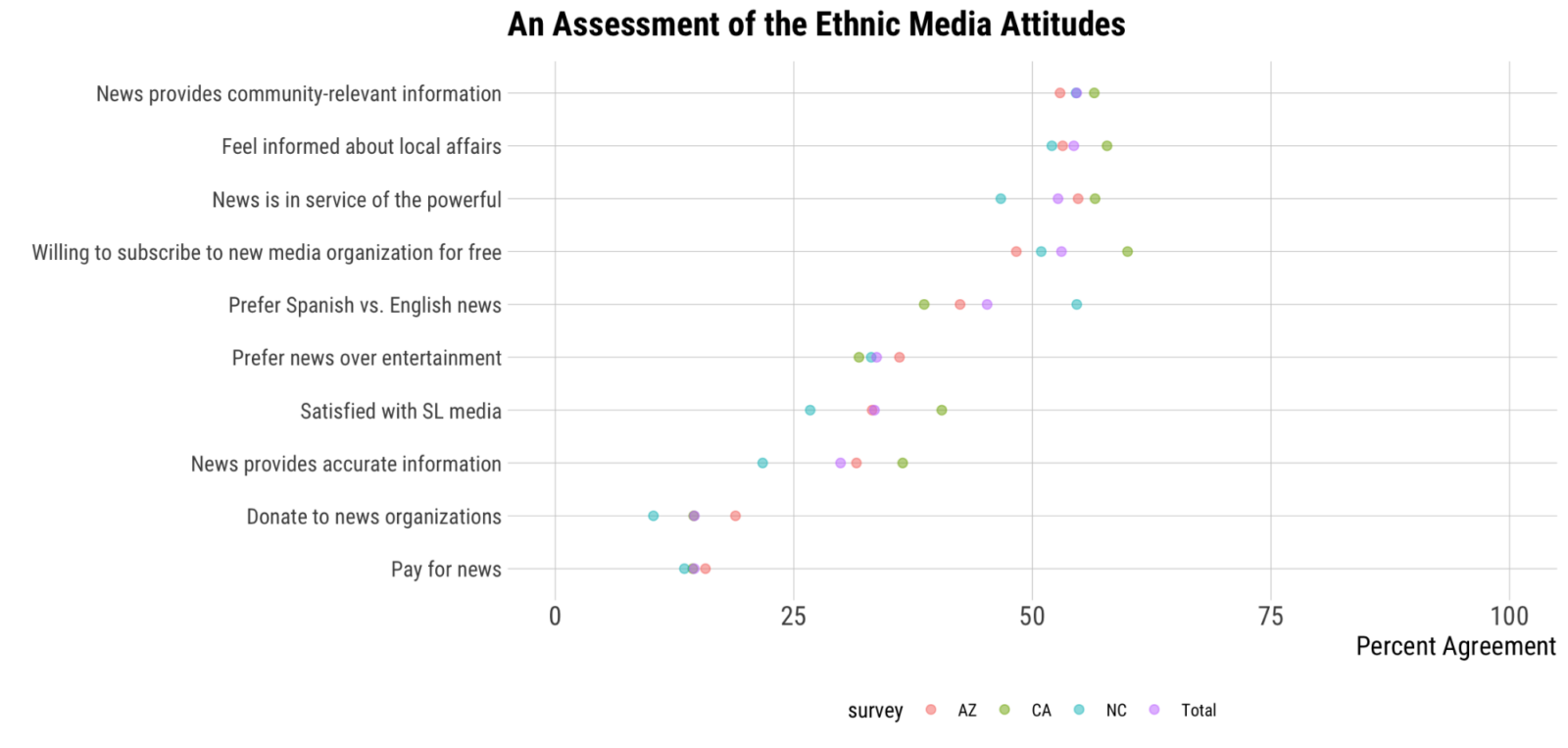Sign up for the daily CJR newsletter.
In recent years, journalists and academics have highlighted the rise of false claims flourishing in Latino communities. The topic has made its way to Congress, as members of the Congressional Hispanic Caucus have called tech leaders to Capitol Hill to answer why platforms have not done enough to address the problem. Stemming the tide of Latino-targeted misinformation requires action, and recent investments in Spanish-language fact-checking and content moderation by the social media companies are encouraging. However, these interventions are only one part of the equation.
Many Latinos live in news deserts, with limited access to reliable information sources. Even when ethnic media are available, commercial outlets balance news and entertainment. My research on the effects of misinformation on Latino communities — co-authored with Ethan Porter and Thomas Wood — finds that consumption of commercial ethnic media is insufficient to counteract the influence of misleading or false information on Latino public opinion. In this media ecosystem, improving information quality among Latinos is crucial for addressing the root causes of “la infodemia.” What is required is an intervention that delivers accurate information and also enables Latinos to engage actively in the political process. Enter community-centered ethnic media outlets (CCEMOs) such as El Tímpano, Enlace Latino NC, and Conecta Arizona.
In recent years, CCEMOs have expanded across the country, producing content using accessible formats such as WhatsApp, e-mail, and text messages. They also tend to have a bottom-up orientation toward their audience, leveraging direct communication via text or email to align their content with audience needs and preferences. In contrast to commercial ethnic media outlets, CCEMOs provide political information with little in the way of entertainment.
Despite the promise of CCEMOs, little is known about their effectiveness in improving civic engagement and knowledge for their Spanish-dominant, and immigrant, audience. To close this gap, I partnered with three community-centered ethnic media outlets (CCEMOs) in North Carolina, Arizona, and California to carry out the first pre-registered randomized controlled trial (RCT) of ethnic media exposure in the US. The trial exposed a group of participants to political news and information from the CCEMOs, while another group followed more traditional outlets. An RCT is the “gold standard” for research design, as it helps to ensure that any differences observed between the groups are due to the intervention being assigned (in this case, exposure to CCEMOs), rather than other factors.
Our three-month study showed the profound impact of these outlets on Spanish-speaking Latinos. Those who consumed content from CCEMOs were more likely to say they “felt qualified to participate in politics” and were more likely to say they would vote during the midterms. They followed local news, but this did not come at the expense of being aware of national politics. Those in our CCEMO group were just as knowledgeable about domestic and international events as those in the control group. Even consumers who preferred entertainment benefited from these outlets, demonstrating that CCEMOs have the potential to reach a wider range of Latino voters than traditional ethnic media outlets.
Information Needs and News Preferences
Before launching into our RCT, we conducted an information needs assessment by recruiting 1,829 Spanish-dominant Instagram and Facebook users across the three locations. We asked Spanish-speakers in these areas about their news consumption habits, media trust, and their attitudes regarding commercial ethnic media outlets. The survey maximized reach by using innovative methods such as automated WhatsApp surveys that allowed participants to complete the survey in the context of a conversation, rather than a traditional online survey.
These initial surveys revealed a great deal of ambivalence toward commercial ethnic media such as Univision and Telemundo. Across the board, we found that feelings toward the media — and ethnic media in particular — were lukewarm. 30% were completely satisfied with Spanish-language offerings, and only a bare majority agreed or strongly agreed with the notion (53%) that the “news provides community-relevant information.” Even fewer agreed or strongly agreed that the news provided “accurate information” (30%). Many open-ended responses about respondents’ dissatisfaction with Spanish-language media cited sensationalism, a narrow focus on specific countries, and an ideological slant.
Still, there was a hunger for news. Our sample showed a great deal of interest in the news and talking about politics with friends and family. A majority of participants were open to trying new media organizations that provide information via WhatsApp or SMS.
There was significant variation in knowledge about politics and medicine. While approximately three-quarters of respondents accurately placed the political parties on a left-right scale (i.e., identifying whether Democrats were to the left of Republicans), only half of our sample knew the party that held a majority in the state legislature. Regarding Covid-19, we observed low levels of vaccine skepticism overall, but found that just under a quarter of the population did not see the vaccines as safe, and perceived booster shots to be ineffective.
Overall, the findings from the information needs assessment pointed to a pressing need for improved access to accurate, relevant, and engaging information sources for Latino communities. The dissatisfaction with current Spanish-language media and the expressed interest in alternative platforms aligned with what the partners had seen in their own work: that there was a need for more grassroots ethnic media outlets that could deliver accurate news and information tailored to local communities.
Evaluating the Impact of CCEMOs on Engagement and Knowledge
Armed with the insights from the information needs assessment, I conducted an RCT with over 350 participants to evaluate the impact of exposure to CCEMOs on Latino civic engagement and knowledge. Half were randomly assigned to a treatment group that would follow political news and information from CCEMOs for eight weeks; half were assigned to a control group that were instructed to follow traditional outlets.
The results of the trial were striking. After eight weeks of exposure to CCEMO content, participants in the treatment group were more likely to report feeling qualified to participate in politics and wanting to vote during the midterms compared to those who followed commercial outlets. Moreover, consuming hyper-local content did not come at the expense of knowing about nationally salient events. Importantly, the impact of CCEMOs extended beyond just the highly politically engaged. Even participants who initially preferred entertainment content saw significant improvements in their political knowledge and engagement when exposed to CCEMO content.
In our final survey, we asked participants what they thought about their community outlets after two months of following them. One individual stated, “Me gusta porque me mantiene informado sobre lo que más nos interesa” (“I like it because it keeps me informed about what matters most to us”). Another participant mentioned, “Las noticias son actualizadas y relevantes” (“The news is updated and relevant”), while a third appreciated that “La información es clara, fácil de entender y me entretiene” (“The information is clear, easy to understand, and entertaining”). A participant also praised the outlet for its coverage of immigration issues, saying, “Me gusta el tratamiento a los temas migratorios” (“I like the way they cover immigration topics”). Another individual mentioned, “Tiene contenido diverso y es algo imparcial” (“It has diverse content and is somewhat impartial”), indicating that they appreciated the outlet’s efforts towards impartiality.
Feedback from those in the control group who followed commercial outlets was more mixed. Individuals appreciated the relevance of the information. As one mentioned, “Me gusta porque me mantiene informado sobre lo que más nos interesa” (“I like it because it keeps me informed about what matters most to us”). One participant also appreciated that the news was in Spanish and focused more on what was happening in the Hispanic community. However, some individuals criticized the excessive bias and propaganda in the news presentation. As one person put it, “No me gusta que hay mucho sesgo en la manera en que se presentan las noticias” (“I don’t like that there is a lot of bias in the way the news is presented”). There were also complaints about the lack of sufficient or appropriate references in some news articles. Overall, while commercial ethnic news outlets provided valuable information to their audience, there were also areas that needed improvement to ensure impartiality and accuracy.
This study highlighted the promise of CCEMOs in shaping Latino civic engagement and knowledge. Participants feel more empowered, and become more knowledgeable about local politics without sacrificing their understanding of domestic politics. These findings are particularly relevant given the growing influence of the Latino community in U.S. politics. By providing a platform for local voices and concerns, CCEMOs can help to bridge the gap between marginalized communities and the political system. Moreover, these outlets fill an important niche within their communities that is not always served by mainstream media, as showcased in the open-ended responses.
Recent election cycles have brought the issue of Latino-targeted misinformation to the national stage. This phenomenon highlights the urgent need for trustworthy and accurate information sources that can counteract the spread of misinformation and promote informed civic engagement among Latino communities. CCEMOs have the potential to play an important role in this regard, by providing reliable information and context that is tailored to the specific concerns and interests of Latino audiences. Moreover, their interactive nature might allow CCEMOs to detect and confront false information more quickly, before it can do significant harm. By countering misinformation and promoting civic and political engagement, CCEMOs can help to ensure that Latino communities have a meaningful voice in the political process.
Has America ever needed a media defender more than now? Help us by joining CJR today.










